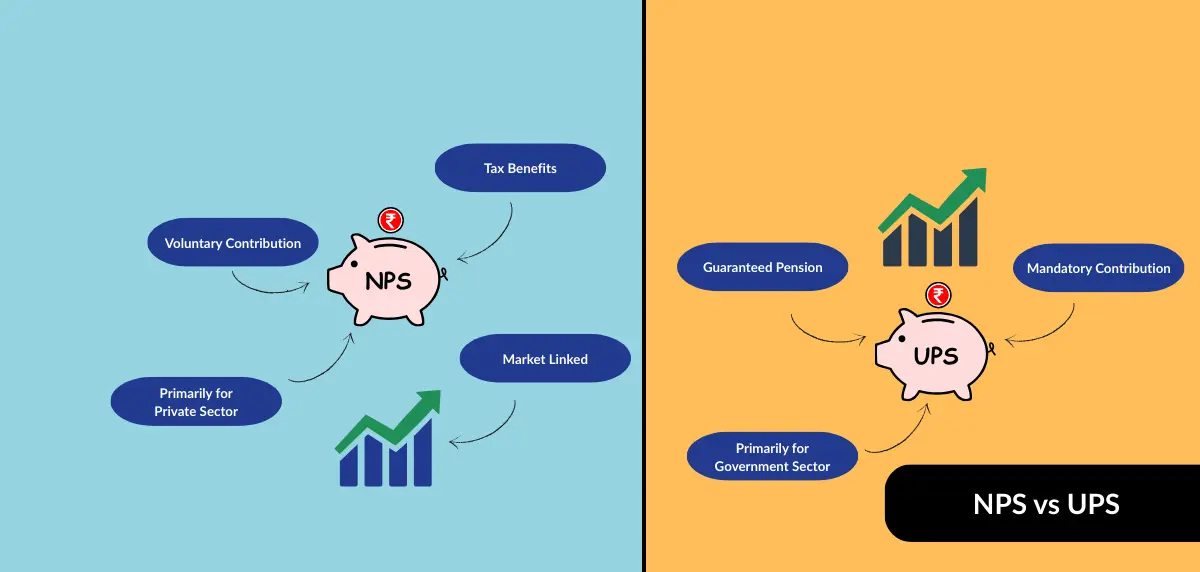If you are a central government employee, you may be facing an important decision regarding your retirement planning: should you go for the newly introduced Unified Pension Scheme (UPS) or stick with the existing National Pension System (NPS)? UPS comes with the security of assured payouts, but there are certain benefits offered by NPS that UPS does not come close to. So, how can one make the decision?
Understanding the key differences between UPS and NPS can help. Let’s first look at what NPS is and what UPS is, in detail.
What is NPS?
The National Pension System (NPS) is a voluntary, market-linked pension scheme introduced in 2004 for government employees.
- It was later extended to private-sector employees, self-employed individuals, and NRIs. Today, it can hold a top position in a working professional’s smart retirement plan.
- Employees contribute regularly to their NPS account. These contributions are invested in equity, corporate debt, and government securities.
- Once the NPS subscriber retires, 60% of the accumulated corpus can be withdrawn tax-free by them. The remaining 40% is invested in an annuity to generate regular income.
- A key characteristic to note when comparing NPS vs UPS is that the former does not offer a guaranteed pension. The returns from your NPS account depend on market performance.
- While you can use tools, such as the NPS calculator, to estimate your retirement income, the actual returns depend on how the market performs. This makes NPS suitable for those comfortable with market risks in their retirement planning portfolio.
Now, let’s dive into UPS.
What is UPS?
Introduced in 2024, the Unified Pension Scheme (UPS) is meant to provide government employees with a more secure retirement solution.
- UPS guarantees pension benefits while still working on a contribution model like NPS.
- Under UPS, employees contribute 10% of their basic salary and DA, while the government contributes 8.5%.
- If an employee has completed at least 25 years of service, as a retiree, they will receive a guaranteed pension of 50% of their average basic salary over the last 12 months. For those who have completed at least 10 years of service, there is a minimum monthly pension of ₹10,000.
- UPS also provides family pensions (60% of the last pension drawn in case of the pensioner’s demise) and adjustments that are linked to inflation rates.
- Unlike NPS, there is no option to receive a lump sum at retirement under UPS.
- Currently, the Unified Pension Scheme is only available to central government employees. There are plans to extend it to state government employees as well.
Now that you know what NPS is and what UPS is, let’s compare them for a deeper understanding.
Key Points of Difference between UPS and NPS**
Here’s a table highlighting the difference between NPS and UPS:
Criteria
| National Pension System (NPS)
| Unified Pension Scheme (UPS)
|
Nature of Scheme
| A pension product where returns depend on how the funds are invested in equity, debt, and government securities.
| A government-backed pension plan that guarantees fixed monthly payouts after retirement.
|
Eligibility
| Open to government employees (post-2004), private-sector employees, self-employed professionals, and NRIs.
| Currently limited to central government employees; may extend to state employees.
|
Minimum Pension Assured
| No minimum pension is promised; returns depend on market performance.
| At least ₹10,000 per month for those with 10+ years of service.
|
Employee Share
| 10% of basic salary plus dearness allowance.
| 10% of basic salary plus dearness allowance.
|
Government Share
| Government contributes 14% of salary and DA.
| Government adds 8.5% of salary and DA.
|
Calculation of Pension
| Corpus grows with market returns; the pension depends on annuity purchase at retirement.
| Pension equals 50% of the average basic salary of the last 12 months if service exceeds 25 years.
|
Withdrawal Rules
| 60% of corpus can be withdrawn tax-free; 40% must be used for annuity.
| No lump sum option; only structured monthly pension.
|
Investment Flexibility
| Different fund manager and investment options available to the subscriber.
| No flexibility in investment choices.
|
Risk Level
| High risk: returns are subject to market volatility and not guaranteed.
| Risk-free to a great extent, since payouts are fixed and government backed.
|
Tax Rules
| Contributions eligible under 80C/80CCD; partial withdrawals tax-free; pension income taxed.
E-E-E product, meaning contributions, accumulation, and withdrawals are tax-free.
| Tax treatment similar to NPS after recent clarifications.
|
Choosing the Right Option
When it comes to UPS vs NPS, the choice depends on several factors.
If You are Looking for Market-Linked Growth and Flexibility: Choose NPS
- If you are a private-sector employee, self-employed, or an NRI, NPS can be a part of your retirement planning portfolio.
- It allows you to earn higher returns while giving you more flexibility.
- Using an NPS calculator, you can plan contributions for long-term retirement planning.
However, remember that returns are market-dependent and there is no guaranteed pension.
If You Are Looking for Assured Pensions with Security: Choose UPS
- For central government employees, UPS provides a guaranteed pension with inflation adjustments.
- It ensures family protection through survivor benefits.
- While the government’s contribution (8.5%) is lower than NPS (14%), the aspect of a predictable income makes it attractive.
While comparing NPS vs UPS can give you a deeper understanding of each product, it is important to remember that these plans alone may not be enough for complete financial independence. Complementing them with other retirement plans from private providers can help you build a stronger retirement portfolio. For example, ULIPs, guaranteed pension solutions, or PPF, can add balance.
The difference between UPS and NPS lies mainly in risk and guarantees. NPS offers flexibility and growth, but it does not come with an assured pension. The Unified Pension Scheme provides government-backed security with predictable payouts. Ensure you make the right decision to ensure a peaceful time during your golden years.
** Tax exemptions are as per applicable tax laws from time to time.
























